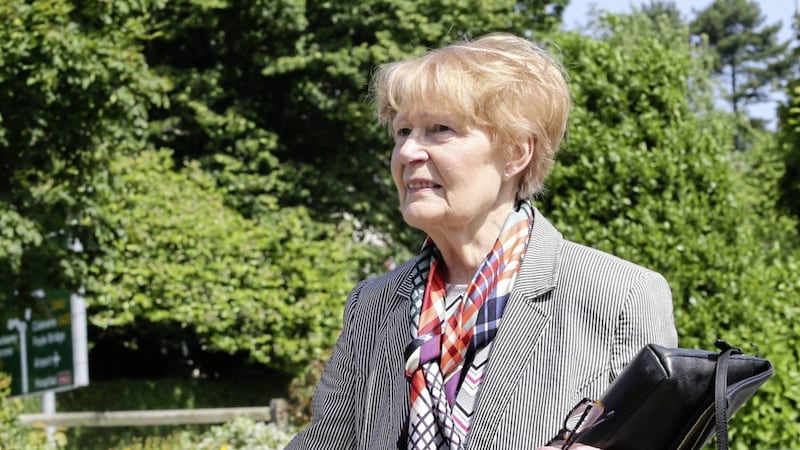PAT Hume’s death appeared in print on the same day as the installation of Lady Chief Justice Siobhan Keegan, first woman to hold the Northern Ireland office.
By the sound of this LCJ, she might appreciate sharing prominence with a remarkable woman from another era.
Pat Hume’s life saw huge change for women, as well as constant need to fight those determined to turn the clock back, in some cases successfully. How she would view that statement is something she took with her.
She won hearts, and sometimes minds, and one of her talents was the ability to engage with broadcasters and other journalists without taking it on herself to speak for the SDLP.
Bríd Rodgers on radio remembered her touchingly as a beautiful young woman in the bleak Troubles, family breadwinner for a time as a teacher. She always believed her John was a one-off, and she was right.
Though widespread admiration for his genuineness always more than outweighed the backbiting and open hostility, the venom of Dublin anti-peace processers in particular upset her, closest witness to the damage he had suffered.
It may have been fellow Derry man Denis Bradley who noted that Hume married a woman with political cop-on ‘plus the inter-personal skills prophets often lack’.
Better other half to a kind of genius, impatient and abstracted, she patently believed and often said that it was reward in itself to be his enabler. He paid her clumsy public compliments.
It’s been rightly noted that she ‘grounded’ her husband, once subject of the joke query (with a jag) ‘What’s the difference between God and John Hume? God is everywhere. John is everywhere but Derry.’
Even when their house was attacked with him away, Pat never ‘grounded’ him by pleading with him to stop flying. She accepted that he took to the air in pursuit of political goals she shared, while on top of raising their five children she ran offices in their home town and for a time Strabane.
No harm to loyal lieutenants down the years, the devoted Mark Durkan, John Tierney and others, she was John’s representative in Derry.
Theirs was a marriage of its time. Her role as seamless homemaker and ‘helpmeet’ - there’s a word – was one that others have played and still play in politics.
Mediocre female politicians are still far fewer than the majority of males through the ages (Although the spectacle of female first ministers went from being novel to underwhelming some time back).
Most helpmeets have been female, which might be changing as parties realise young and able women win votes. It has rarely looked winning in itself.
But Pat Hume was a winner. She asked newcomers if they had been to the Church of Ireland St Columb’s Cathedral inside Derry’s walls, and if they said no and she had time she escorted them, presumably if she thought them less than obnoxious. Though she was such a diplomat, who knows.
She would duly cite Hume’s little boast that a St Columb’s plaque name-checked a Protestant John Hume from the 17th century.
Her other starter-pack gambit was the Grianán, so you could log Irish pre-history and geography plus the jewel of old Londonderry inside a couple of hours. No wonder journalists loved her. They got unfakeable sincerity thrown in, and the warmest smile.
The tributes that immediately marked her death were a study in themselves, a glad consensus. Was it Derry man Martin McGuinness who once remonstrated with someone marvelling at republican politeness that ‘our mothers taught us manners’? In a people capable of grace as well as murderous bitterness, sharing a kind thought is welcome, perhaps a kind of relief.
And in private and public women have an acknowledgement deficit, to put it very mildly.
Pat Hume reaped courtesy that mirrored her own. Lord Kilclooney completely appropriate, DUP First Minister Paul Givan graceful; it doesn’t feel too familiar to guess how Pat Hume would have enjoyed that.








